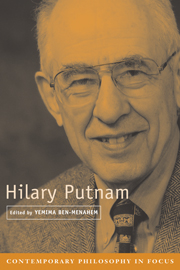Book contents
- Frontmatter
- Contents
- List of Contributors
- Acknowledgments
- 1 Introduction
- 2 Putnam's “The Meaning of ‘Meaning’”: Externalism in Historical Context
- 3 The Face of Perception
- 4 Realism, Beyond Miracles
- 5 Putnam on Skepticism
- 6 The Tale of Quantum Logic
- 7 Another Philosopher Looks at Quantum Mechanics, or What Quantum Theory Is Not
- 8 Structural Realism and Contextual Individuality
- 9 The Rise and Fall of Computational Functionalism
- 10 The Pragmatic Turn: The Entanglement of Fact and Value
- Index
- References
6 - The Tale of Quantum Logic
Published online by Cambridge University Press: 08 January 2010
- Frontmatter
- Contents
- List of Contributors
- Acknowledgments
- 1 Introduction
- 2 Putnam's “The Meaning of ‘Meaning’”: Externalism in Historical Context
- 3 The Face of Perception
- 4 Realism, Beyond Miracles
- 5 Putnam on Skepticism
- 6 The Tale of Quantum Logic
- 7 Another Philosopher Looks at Quantum Mechanics, or What Quantum Theory Is Not
- 8 Structural Realism and Contextual Individuality
- 9 The Rise and Fall of Computational Functionalism
- 10 The Pragmatic Turn: The Entanglement of Fact and Value
- Index
- References
Summary
Like all good tales, this is a story about temptation. It all begins with Kant.
In the first Critique, Kant posed the fateful question: how is a priori synthetic knowledge possible? Among the items of undoubted knowledge to be accounted for: that the world as revealed by experience shall be in a Euclidean space; that it shall be governed by deterministic laws; that all substance is permanent, being neither created nor destroyed.
The detailed argumentation brought forward in support of these claims is famously obscure, but the general outlines of the position are easy to sketch. We can know a priori that the world of experience will conform to these principles, not because they are conditions on things as they are in themselves, but rather because they are conditions on how things must be presented to us and conceived by us and judged by us in order to constitute experience. Items of experience must be given to us in perception, and so are subject to the forms of perceptive intuition (space and time). Further, in order to judge that our perceptions are of objective things, the appearances of things must conform to certain rules. In short, a priori synthetic knowledge is possible because it is not knowledge of how things are, but knowledge of how the world as revealed by experience must be, in order to be a world revealed by experience.
The progress of science was not kind to Kant.
Information
- Type
- Chapter
- Information
- Hilary Putnam , pp. 156 - 187Publisher: Cambridge University PressPrint publication year: 2005
References
Accessibility standard: Unknown
Why this information is here
This section outlines the accessibility features of this content - including support for screen readers, full keyboard navigation and high-contrast display options. This may not be relevant for you.Accessibility Information
- 15
- Cited by
